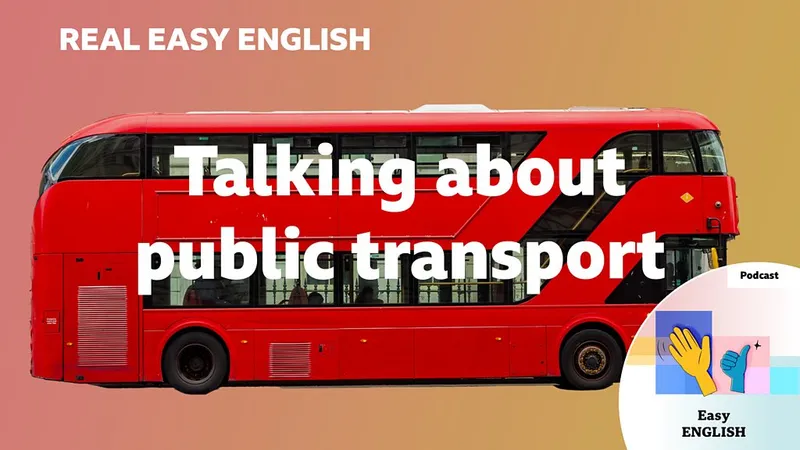Neil Hello and welcome to Real Easy English, the podcast where we have real conversations in easy English to help you learn. I’m Neil, and with me is Georgie.
Georgie Hello. Did you know that you can now watch a video of this podcast? And you can read along with a transcript on our website. Visit bbclearningenglish.com.
Neil Hi, Georgie. How are you?
Georgie I’m very well, thank you, Neil. How are you? How was your journey into work?
Neil My journey into work was very good today, actually. And we’re actually talking about transport today. How was your journey to work?
Georgie My journey was quite easy this morning, actually. It isn’t always. And, Neil, we actually have a very similar commute, don’t we? I get the Tube to work, which in the UK is the underground train. So I walk to the station around 15 to 20 minutes, and then I get the underground train, one train, and then I change and then get another one, and then I walk to work. What about you?
Neil I do that, but before, before your bit, I have to get a bus as well.
Georgie Are you that far away from the station?
Neil A couple of miles.
Georgie OK.
Neil Three kilometres.
Georgie A bit too far to walk, then.
Neil A bit too far to walk. I have walked when the public transport has been unreliable. But normally I, I get the bus to the Tube stop, and then I get on the Tube into work.
Georgie Lovely. And do you like the Tube? What do you think about it?
Neil I think the Tube is very convenient, actually, because the trains go very frequently. So if you miss one, you can wait just a couple of minutes and get the next one. And it’s probably the quickest way to get into central London because there’s so much traffic. Driving is a really bad idea.
Georgie Yeah, I agree with you. It is very reliable. It’s usually very easy. The thing I don’t like about it, especially in the morning at rush hour, is the number of people on the Tube. The, the underground trains in London are very old. They’re very small. And they are very crowded in the mornings. So crowded means there’s lots of people. We can also say packed. Yeah. And I really don’t like being in a tight space with lots of people in the mornings, so early in the morning.
Neil Yeah, I agree, but I’m lucky because I get on the Tube at the first stop, so I always get a seat, but then by the time you get on, it is usually really packed. And the closer you get into central London, the more packed it is. You’re squashed up against strangers. It’s not always fun.
Georgie I hate it. What about buses? Do you like buses?
Neil Buses are OK. They, in London again, they are quite frequent. And that’s convenient.
Georgie Not always. I mean, they are, they’re frequent, but they’re more unreliable than trains, aren’t they?
Neil There always seems to be roadworks near where I live, and when there are roadworks, there are traffic lights and then there are delays on the buses.
Georgie So in the city, public transport can be great. But what about when we go outside of the city? What do you use to go to other parts of the UK?
Neil If it’s quite far, so if I’m going really far north, maybe to Scotland or to, I don’t know, Manchester or a northern city, it’s probably better to get the train because it’s faster and I really like trains. You can relax. It’s a relaxing experience. Some of my best travel experiences have been on long distance trains.
Georgie Yeah?
Neil Yeah.
Georgie Can you… Where have you been that’s been so fantastic on a train?
Neil Well, I once went from Prague to Moscow on a train.
Georgie Wow.
Neil Yeah.
Georgie What was that like?
Neil Really exciting.
Georgie Why?
Neil It took about three days, and I was with some friends, and we could eat and drink and look out the window. The landscape changed frequently. It was just exciting.
Let’s recap the vocabulary we heard in this podcast, starting with some useful adjectives to describe public transport. For example, we had crowded, which means very busy. We also hear packed.
Georgie We had reliable, which describes something you can trust, and unreliable which describes something you can’t trust.
Neil We heard frequent, which describes something that happens often.
Georgie And we also heard delayed, which means something, like public transport, comes later than expected.
Neil That’s it for this episode of Real Easy English. Don’t forget to go to our website where you can get a free worksheet to download to test what you’ve learnt. It’s at bbclearningenglish.com.
Georgie Next time, we’re talking about different times of year. Spring, summer, autumn and winter. See you then.
Neil Goodbye.
Georgie Bye.
